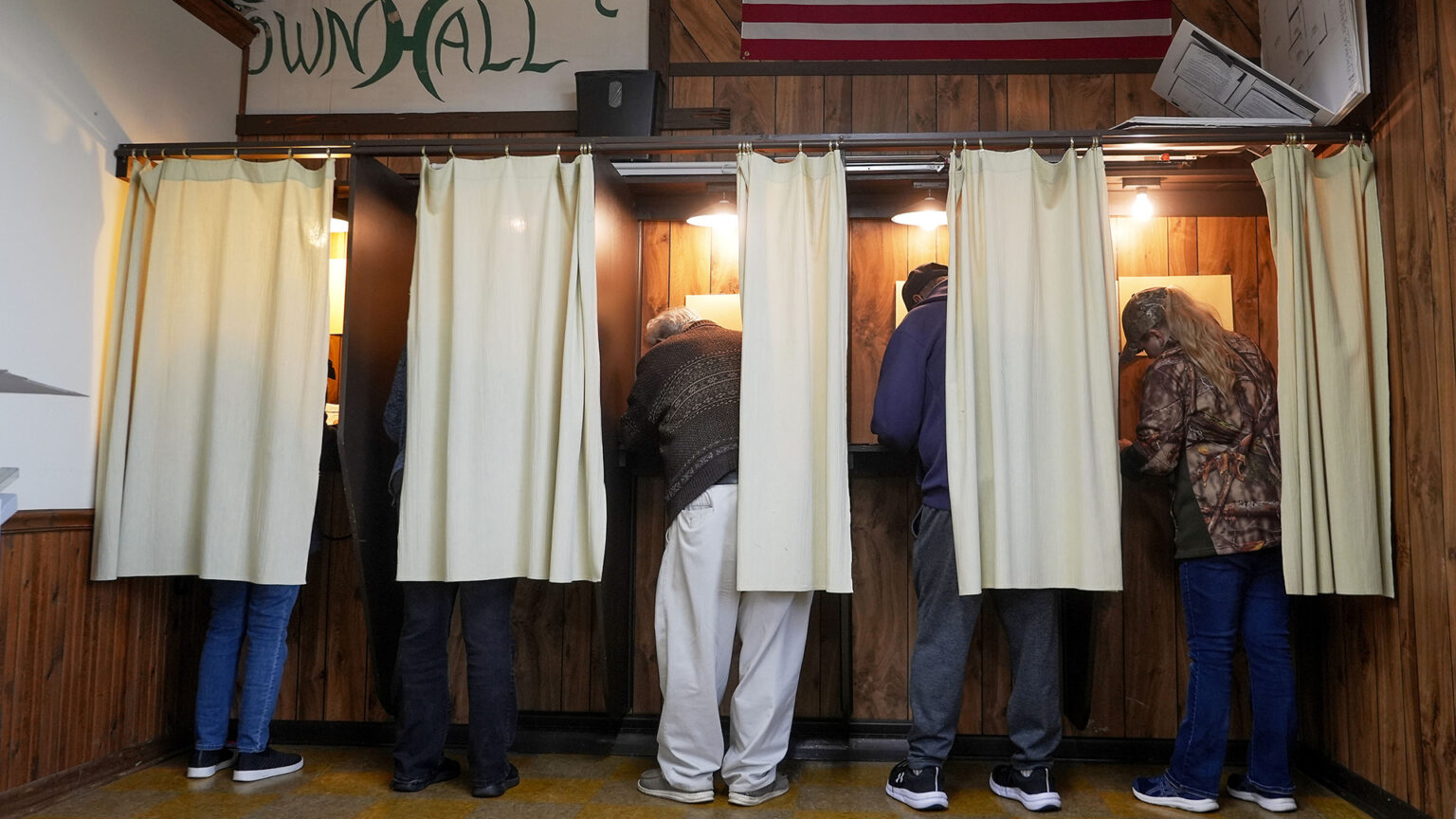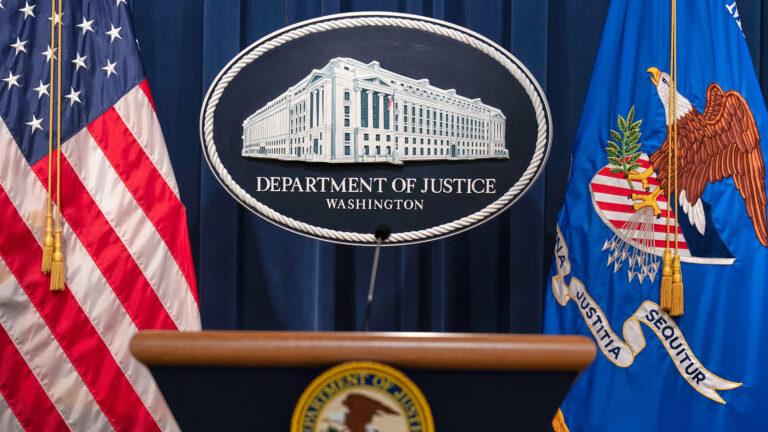Republicans hold majority in Wisconsin Legislature, citizen voting measure passes
Republicans have maintained control of the Wisconsin Legislature in the 2024 election under new boundaries put in place by Gov. Tony Evers, and voters have also approved a Republican-authored constitutional amendment that bars foreign nationals from voting in the state.
Associated Press
November 6, 2024

Voters mark their ballots at a polling place on Nov. 5, 2024, in the town of Mitchell in Sheboygan County. (Credit: AP Photo / Morry Gash)

MADISON, Wis. (AP) — Republicans emerged from the Nov. 5 election still in complete control of the Wisconsin Legislature, overcoming new district boundaries that Democrats had hoped would give them a chance at finally making major inroads in both chambers.
Voters also approved a GOP-authored constitutional amendment that bars foreign nationals from voting in Wisconsin.
Here’s a look at what was at stake for the Legislature and the Republican-authored constitutional amendment designed to ensure only U.S. citizens can vote in Wisconsin.
Wisconsin Legislature
Democrats came out of the Nov. 5 election with substantial gains in the Wisconsin Legislature under new district boundaries, setting them up for a run for a majority in 2026.
Democrats had high hopes that the maps would enable them to seize control of the state Assembly for the first time in 13 years. That didn’t happen, but their wins still stood out given that Republican President-elect Donald Trump carried Wisconsin.
“Thanks to fair maps and a smart strategy, the GOP’s stranglehold on Wisconsin’s Legislature is coming to an end,” Heather Williams, president of the Democratic Legislative Campaign Committee, said in a statement. The DLCC is the arm of the Democratic Party tasked with building majorities in state legislatures.
Republicans took control of the Senate and Assembly in 2011. Democrats used recall elections to win a Senate majority for six months in 2021, but otherwise the GOP has controlled both houses since then thanks largely to gerrymandered district maps that spread out Democratic voters.
Liberal justices who took control of the state Supreme Court in 2023 tossed out the maps, clearing the way for Democratic Gov. Tony Evers to enact new boundaries. Democrats made no secret on the campaign trail in the summer of 2024 that they thought the new boundaries would translate to control of the state Assembly and help them flip enough Senate seats that they’d have a shot at a majority in that chamber in 2026.
The plan mostly worked. Democrats failed to take control of the Assembly, but unofficial results Wednesday showed they had flipped 10 Republican seats, narrowing the GOP’s edge from 64-35 in the previous session to 52-44 with four races still undecided.
Eight of the seats the Democrats converted were open thanks to retirements and the new maps. They also defeated two Republican incumbents — Tom Michalski, who represented Milwaukee’s western suburbs, and Loren Oldenberg, who represented a section of a far western Wisconsin south of La Crosse.
“Flipping a legislative body isn’t easy, but we have fundamentally shifted the status quo in the Legislature and set the stage for more progress in the future,” Assembly Democratic Minority Leader Greta Neubauer said in a statement on Nov. 6. “Our work continues.”
Republican Assembly Speaker Robin Vos attributed the Democrats’ gains to Evers’ maps. He said Democrats used out-of-state money to dramatically outspend Republican candidates. He also accused Democrats during a news conference of lying and distorting GOP candidates’ records.
“I think most Assembly Republicans who watched it will never forget the despicable tactics used in an attempt to claw power,” Vos said. “They were clearly wrong and again now we get to set the agenda for the rest of the state with our colleagues in the state Senate.”
On the Senate side, Democrats had managed to flip three Republican seats as of midday on Nov. 6.
Counselor Sarah Keyeski ousted GOP incumbent Joan Ballweg in south-central Wisconsin. Green Bay Water Commission Vice President Jamie Wall defeated Republican Jim Rafter in a battle for an open seat in northeastern Wisconsin. Republican Eric Wimberger had held the seat since 2021 but the new maps drew Wimberger into a different district. He won that seat on Tuesday night. Appleton Common Council member Kristin Alfheim defeated Republican physician Anthony Phillips to win an open seat in the Fox Valley that the GOP had held since 2013.
Republican Sen. Duey Stroebel conceded defeat to Democrat Jodi Habush Sinykin on the morning of Nov. 6 in a battle for an open seat representing Milwaukee’s northern suburbs. The Associated Press had not called the race as of the afternoon of Nov. 6.
Republicans have held that seat since 1993. Stroebel had represented an adjoining district but the new maps pushed him into the open district.
All that narrowed the Republican advantage in the Senate from 22-11 to 18-14 with the Stroebel-Sinykin race still undecided.
The Democratic gains erased the GOP’s supermajority in the chamber, ensuring that Republicans won’t have enough votes to override any Evers vetoes when the next legislative session begins in January. They also put Democrats within striking distance of a majority in 2026.
Senate Democratic Minority Leader Dianne Hesselbein did not immediately respond to an interview request.
Like Vos, Republican Senate Majority Leader Devin LeMahieu attributed the Democrats’ gains to the new maps and huge spending. LeMahieu also accused Democrats of distorting Republicans’ records on birth control and in-vitro fertilization.
“It’s disappointing,” he said. “The good thing is Trump won Wisconsin. Republicans still have a winning message. I still think a majority of voters favor Republicans. We’ll roll up our sleeves and continue to fight for what’s important for Wisconsin.”
He said the GOP is already planning for the 2026 elections.
“2026 is a long way away, but we’ll have some good incumbents running who will have two more years to get to know their constituents,” LeMahieu said. “We’ll see. First we have to start a new session and make sure we govern responsibly.”
Citizenship voting amendment
Wisconsin voters approved a constitutional amendment in the Nov. 5 election that prohibits foreign nationals from voting in the state.
“Voters have delivered an unmistakable message: Wisconsin elections will be decided by U.S. citizens, not far-left activists who would turn the ballot box into a petri dish for extremist policies,” state Republican Party Chair Brian Schimming said in a statement.
Republicans across the country have been pushing voters to adopt constitutional amendments that explicitly prohibit non-U.S. citizens from voting. The move was spurred by the District of Columbia and municipalities in California, Maryland and Vermont allowing non-citizens to vote in local elections.
The Wisconsin Constitution states that every U.S. citizen who is at least 18 can vote. The amendment revises that language to read that only U.S. citizens can vote in federal, state and local elections held in Wisconsin.
The amendment was on the ballot in seven other states besides Wisconsin this cycle, according to Ballotpedia. North Dakota, Alabama, Florida, Colorado, Ohio and Louisiana have already adopted it.
Democrats contend the measures could create hurdles for legal voters and lead people to believe that the problem of noncitizens voting is bigger than it really is. Data from states indicates that voting by noncitizens is rare, although Republican officials in Alabama, Georgia, Ohio and Texas have highlighted voter registration reviews that turned up potential noncitizens.
 Passport
Passport











Follow Us